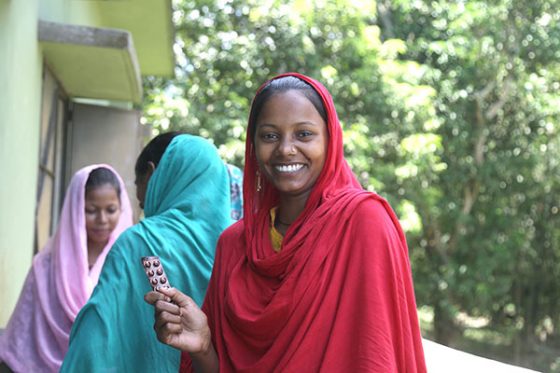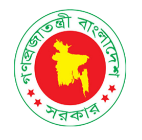Written by Sairana Ahsan, Reporting and Documentation Manager of SHOUHARDO III, CARE Bangladesh.
 The world celebrates Menstrual Hygiene Day every year on 28th May. This year it was mostly celebrated virtually due to the pandemic situation. Many countries, including Bangladesh, have relaxed the lockdown situation from June’20. The latest figures for COVID-19 infected patients in Bangladesh have been seeing an all-time high each passing day; as of 14th June’20, a total of 3,141 new infections were identified, summing up to 87,520 infected patients in total since 8th March’20 (Corona Info) . SHOUHARDO III of CARE Bangladesh has been constantly reaching out to its participants in remote areas that were selected for COVID-19 response strategy. These areas were specially selected for the vulnerability factor of the program participants. Menstrual Health is often neglected by people during an ongoing crisis. We spoke with eight adolescent girls (12-18 years old) from SHOUHARDO III households (HH) on ways they dealt with their menstrual health and hygiene during the pandemic lockdown period.
The world celebrates Menstrual Hygiene Day every year on 28th May. This year it was mostly celebrated virtually due to the pandemic situation. Many countries, including Bangladesh, have relaxed the lockdown situation from June’20. The latest figures for COVID-19 infected patients in Bangladesh have been seeing an all-time high each passing day; as of 14th June’20, a total of 3,141 new infections were identified, summing up to 87,520 infected patients in total since 8th March’20 (Corona Info) . SHOUHARDO III of CARE Bangladesh has been constantly reaching out to its participants in remote areas that were selected for COVID-19 response strategy. These areas were specially selected for the vulnerability factor of the program participants. Menstrual Health is often neglected by people during an ongoing crisis. We spoke with eight adolescent girls (12-18 years old) from SHOUHARDO III households (HH) on ways they dealt with their menstrual health and hygiene during the pandemic lockdown period.
Lockdown effect
The pandemic lockdown had a more or less similar impact on the lives of adolescent girls that we interviewed and their families. Nutritious food was copped out from daily diet, many couldn’t work due to restrictions on movement, a few received relief from Government of Bangladesh (GoB) and one family received money from SHOUHARDO III through BKash before Eidul Fitr. The struggle to generate an income for all the families was the major disadvantage they had. Fulti (12 years old from Narayanpur Village, Nageshwari, Kurigram) shared that her family’s income fell since her mother couldn’t work. Her mother was the sole earner of the family and worked at peoples’ houses or as an agricultural worker. Her father abandoned them long ago. They cooked once a day, sometimes they didn’t have enough food for all three meals a day and all the family members. She lamented, “Since there was no work, then no money and no grocery. As a result, no food either.”
Daily life and Coronavirus 2019
The girls were able to study at home; sometimes even studied with siblings. However, their major concern was that there was no one to help them with studies since the schools were closed. Thy didn’t have access to internet or TV classes that have been provided by GoB since the start of lockdown. Upon asking about the pandemic and health guidelines during the lockdown and now, all girls except for two shared that they knew that it is a contagious disease and people are getting infected in large numbers every day. They also knew about washing hands with soap, not going outside, cleaning houses, wearing mask and not to gather in one place with too many people. One adolescent girl named Ropali (13 years old from Dalarkandi, Kalma, Austagram, Kishoreganj) had a different idea, “Coronavirus is the curse from Allah. It is the punishment for human for making so many sins,” however, she too shared that frequent handwashing, staying inside and keeping the household area clean was required to prevent COVID-19 infection, “There is a handwashing point in our village made by SHOUHARDO III, we all go there and wash our hands with soap.” Except for one, everyone knew that the COVID-19 symptoms are fever, coughing, sneezing, and breathing problem. Only one girl did not go out of her home during quarantine and neither had any TV or mobile phones to have access to Coronavirus 2019 information. Other mostly obtained the pandemic related information from neighbours, TV, mobile phone and internet. Their daily lives were filled with house chores and sometimes studying. They all helped out their mothers. Surprisingly, half of them declared that the male members of their families helped out in household chores, i.e. cleaning and organizing. This is a narrative that is usually the opposite in non-pandemic times in Bangladesh- men don’t help with domestic chores. A few were engaged in gardening at home, but most of them also spent time watching TV or playing games on mobile phones.
The health of adolescent girls
We asked about the adolescent girls about their menstrual health and hygiene management during the pandemic, along with taking iron and folic acid (IFA) supplements. Only one adolescent girl out of eight, Munni (16 years old from Dhupulia, Omarpur, Chauhali, Sirajganj) shared that she took IFA supplements as she knew about it from her mother who was a volunteer for SHOUHARDO III. She shared, “Last time I took IFA was in March, I collected it from our nearby community clinic.” It is unfortunate that the other seven girls had no idea about IFA or where to take them from. Needless to say, IFA is an important element for health as many girls may have iron deficiency that may lead to anaemia. The days when they had their period had an array of challenges. Majority of the girls had to use clothes as napkins during the lockdown. It is usually because the sanitary napkins that they had bought before lockdown ran out. They had to switch to cloth napkin during the lockdown as the shops were not open; three girls could stock up as they found pharmacy shops open for a limited time. Three girls used cloth napkins from before. Some washrooms were far from the house and it was difficult for the girls to use the washroom regularly to clean the cloth napkins during the lockdown. Maya (12 years old from Pipalia, Fulchhari, Gaibandha) shared, “The situation was different during the pandemic…I could not go outside, was unable to use the washroom timely to change and clean up.” Generally, the cloth napkins are advised to be washed using soap and water and let them dry under sunlight. Some had to let them dry indoors as they feared the male members of the family would see the cloth napkins. One girl (Fulti, 12 years old from Narayanpur Village, Nageshwari, Kurigram) shared that her family couldn’t afford to buy any soap or detergent during the pandemic, hence she washed the used cloth napkin with water and hung them dry inside their home so no one could see the stained cloth. This is particularly important to point that this practice is dangerous to women as the clothes are reused without being properly clean and dried, and bear the risk of reproductive organ infection. All but one of the girls couldn’t have a healthy diet of meat, fish, milk, eggs or vegetables due to markets being closed or having no income. They ate what other family members ate. The girls shared their menstruation issues with their mother to seek help, and mostly got help. Aklima (12 years old from Lama gaon, Dakshin Sreepur, Tahirpur, Sunamganj) usually always used sanitary napkins and bought them with the help of her friends and cousin. However, during the lockdown, she ran out of sanitary napkins and asked her mother for help. Aklima shares her frustration, “I shared my problems with my mother…she couldn’t give me any alternative solutions. She suggested that I use clothes napkin instead of sanitary napkins for that time. It was really uncomfortable.” Most of the mothers let the girls rest from the usual domestic chores during their menstruation time, there are a few exceptions where they lived their daily regular life with no change.
The lockdown made the male members of the family to stay at home for most of the time, which in turn posed difficulties for the adolescent girls to hang their used clothes for drying, disposing the used sanitary napkins or just rest and not do any house chores. Some hung the used clothes under other clothes for drying inside and outside their houses, some threw away the used cloth napkins without any means i.e. no dustbin, no burying. One girl buried her used sanitary napkins in her backyard. Another girl had a separate dustbin in their house for waste disposal of sanitary napkins only. As many girls had to switch to cloth napkins from sanitary napkins, it was a rather uncomfortable experience for them during the lockdown due to presence of male members of the family most of the time inside the home. Hazera (15 years old from Khoysher, Khatkhal, Mithamain, Kishoreganj) shared, “I went through extreme difficulty regarding the waste disposal. I kept a trash bucket inside of the house where I disposed the used napkins during the lockdown. It was difficult taking that out and empty it in front of everyone. I had to dry the clothes beneath other clothes (Saree/ orna) since the male members were at home.”
Way forward
The pandemic is not the end of life. Like many others, the adolescent girls also want to go back to their regular lives that they had before lockdown. However, only one out of eight interviewees shared that she received a life skills training from SHOUHARDO III. She took a two-days long life skills training that provided information on maintaining hygiene, effective communication, income-generating activities, improved business skills, flood precautions and many more. She wants to pursue a vocational training on driving as she finds it fascinating. Kolpona (18 years old from Cherar gaon, Uttar Sreepur, Tahirpur, Sunamganj) shared, “I feel good thinking about that a woman can drive, I want to learn and work at city level someday.”
The main challenge of conducting these phone interviews was the rigidity of parents letting the adolescent girls speak in private. Hence many had their speaker on or had someone else beside them. One girl’s mother also tried to dictate her responses during the phone calls. It is particularly challenging to talk to adolescent girls during in-person interviews as well, because parents have fear of their daughters’ security. They think their daughter might answer something out of line which might create problems in future, or the interviewer might have sensitive information that can jeopardize their daughters’ future. Additionally, the younger adolescent girls didn’t have their own phone and were rather using their parents’ phones to answer to the phone interviews.
Menstrual health seems to suffer in all sorts of crisis in this world for girls belonging to poor families. It was no different during the pandemic lockdown either. One way to tackle this is to advocate for menstrual health supplies and hygiene management during response initiatives and relief distribution so those who are most vulnerable, the adolescent girls, can have care for their health during menstruation.
June 14, 2020


